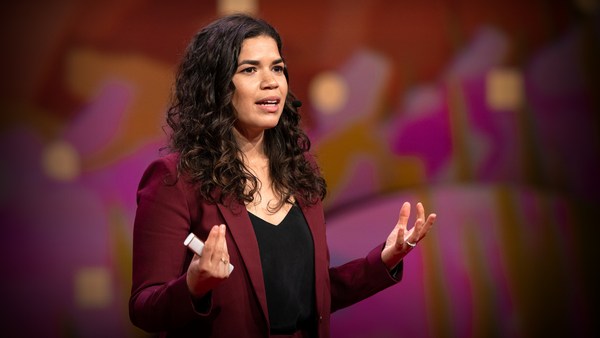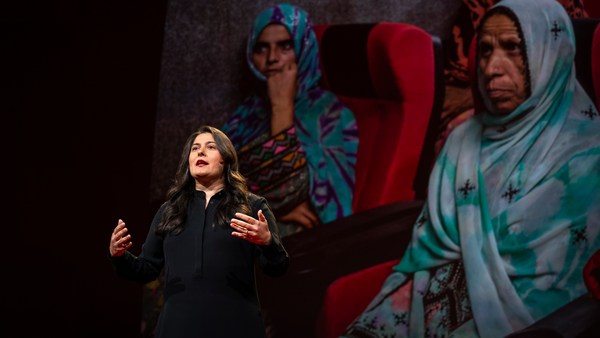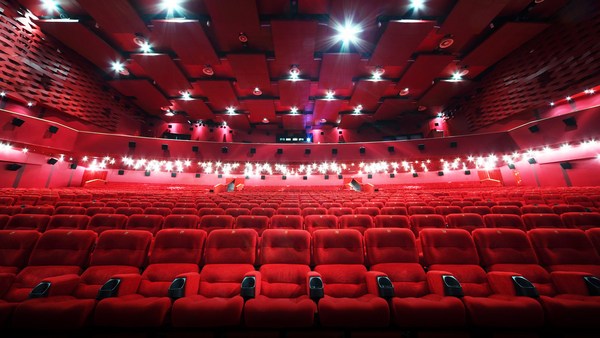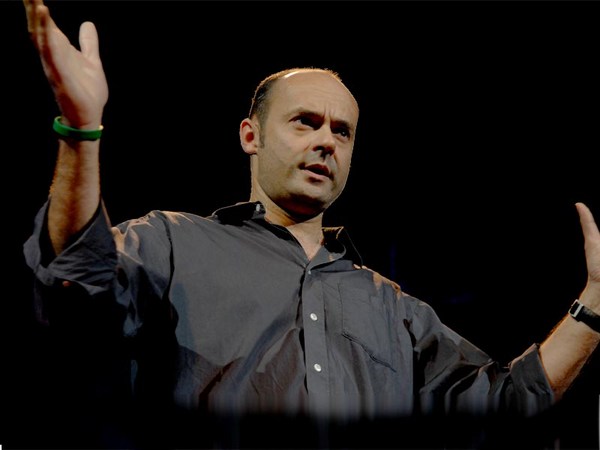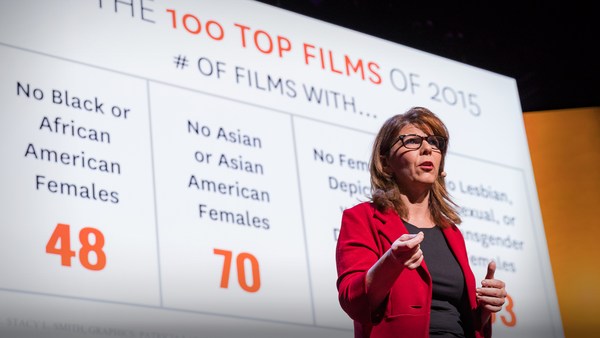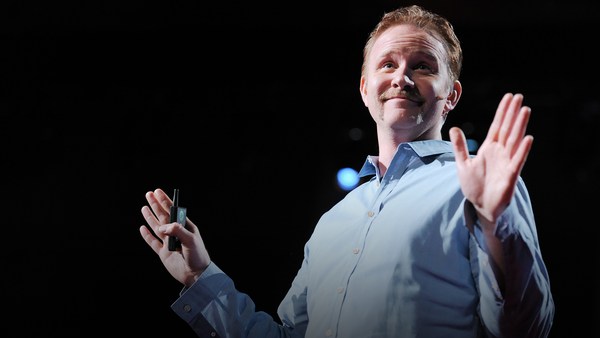The Silicon Valley and the internet gave me superpowers, tools to go to battle with, a suit to take bullets with and a giant signal in the sky that told me when it was time to fight.
Now, I can't actually prove any of this. I am not a "scientist," I don't have "facts." In fact, my Rotten Tomato score is running around 50 percent right now, so I'm not sure why they let me in.
(Laughter)
But if we're talking about colliding with a power that's bigger than us, then I'm in the right place, because this last year, I had an interesting year with a movie called "Crazy Rich Asians" that I did --
(Applause and cheers)
Thank you, thank you.
And if we're talking about connection specifically today, then I know my story is only possible because of a collection of connections that happened throughout my life, and so hopefully by telling a little bit of my story, it will help someone else find their path a little sooner than I did.
My story begins when I opened the holy book for the first time ... The holy book of gadgets, of course, "Sharper Image."
(Laughter)
Yes, those who know. It was a magical magazine of dreams and had things in there that you knew could not possibly exist, but it was right there. You could order it -- come in the mail. And some things that probably should have never existed, like "Gregory," a lifelike, portable mannequin who deters crime by his strong, masculine appearance. This is a real --
(Laughter)
This is a real thing, by the way.
(Laughter)
But my eyes were set on the Sima Video Ed/it 2. This thing was so cool at the age of 10. You could connect all your VHS players together and cut something together, so I called my parents and convinced them to buy this for me. But before I get into that, let me give you a little rundown about my parents. They came to the United States when they were young, they're from Taiwan and China and they settled in Los Altos, California -- the Silicon Valley before the Silicon Valley -- and they started a restaurant called Chef Chu's. 50 years later, today, they still work at the restaurant, they're still there, and I grew up there, so it was great. Talk about connection -- this place was a hub of connection. People coming there to celebrate birthdays, anniversaries, business deals, eating, drinking -- connection. And I got to grow up in that environment. And my parents always said America is the greatest place in the world. You can -- if you love anything, you can work hard and you can accomplish anything you want. So, they raised five all-American kids. I am the youngest -- you can see I'm the one with the eyes closed there -- and they named actually my sister and I, Jennifer and Jonathan, after Jennifer and Jonathan Hart from that TV show "Hart to Hart."
(Laughter)
So that's how much they loved America, apparently. And they thought that we were The Kennedys -- my mom specifically -- so she dressed us up all the time like each other and she put us in etiquette classes and ballroom dance classes, made sure that we had the right dental plan --
(Laughter)
This is a real picture of me. That is not fake. Thank God for that one.
And I was in charge of the video camera every time we went on vacations, so I would collect all these videos and had nothing to do with it. Thus, the Sima Video Ed/it 2. I convinced them to get it for me, and I spent all night trying to wrangle all the VCRs from my brother's and sister's room, tangled in wires, and now I had something to show them. So I brought them into the living room one night, it was probably 1991, somewhere around there, and I sit them down in the living room -- my heart was pounding, my breaths were deep -- sort of like right now -- and I pressed play and something extraordinary happened actually. They cried. And cried. They cried not because it was the most amazing home video edit ever -- although it was pretty good --
(Laughter)
but because they saw our family as a normal family that fit in and belonged on the screen in front of them, just like the movies that they worshipped and the TV shows that they named us after. I remember as the youngest of these five kids feeling heard for the first time. There was this place where all these things in my head could go into the great, electric somewhere-out-there and exist and escape, and I knew from this moment on, I wanted to do this for the rest of my life, whether I was going to get paid for it or not.
So I had this passion and now I needed some tools, and my dad went to work. He continued to brag about my home video editing skills to the customers at Chef Chu's, and luckily this is the Silicon Valley, so they're working on stuff, hardware and software -- these are all engineers. And they offered to give me things for digital video editing. This is like the mid-'90s, early '90's, where this stuff didn't exist for kids like me. So I'd get this beta software and hardware from places like HP and Sun and Russell Brown at Adobe. And I had no manual, so I'd figure it out and I fell in love with it even more.
I went to USC School of Cinematic Arts and started to go there, and my mom and dad would always call me randomly and remind me that I've got to do movies about my Chinese heritage. That China was going to be a huge market for movies one day. I was like, "Yeah right, guys".
(Laughter)
Always listen to your parents.
(Laughter)
I wanted to be Zemeckis, Lucas and Spielberg. The last thing I wanted to talk about was my own cultural identity, my ethnicity. And honestly, I had no one else to talk -- there was no one at school that I could really open up to, and even if I did, like, what would I say? So I ignored it and I moved on with my life.
Cut to 15 years later, I made it in Hollywood. I got discovered by Spielberg, I worked with The Rock and Bruce Willis and Justin Bieber. I even came to the TED stage to present my dance company LXD, and it was great. And then a couple years ago, I felt a little bit lost, creatively. The engine was going down a little bit, and I got a sign ... I heard from voices from the sky ... or more it was like, birds. OK, fine, it was Twitter. And Twitter --
(Laughter)
It was Constance Wu on Twitter, it was Daniel Dae Kim, it was Jenny Yang, who's here today, it was Alan Yang -- all of these people who were writing their frustrations with representation in Hollywood. And it really hit me. I thought these things but never really registered -- I was really focused on -- and I felt lucky to be working, and so then I realized -- yeah, what is wrong with Hollywood? Why aren't they doing this? And then I looked at myself in the mirror and realized I am Hollywood. I literally -- I popped my collar before I came out here, that's how Hollywood I am.
(Laughter)
Is it still up? OK, good.
(Applause)
For all these years I felt I had been given so much, and what was I giving back to the film business that I loved? I felt lucky to be here, but at this moment, I realized that I was not just lucky to be here, I had the right to be here. No, I earned the right to be here. All those sleepless nights, all those parties I missed on Fridays, every friend and girlfriend I lost because I was editing -- I earned the right to be here not just to have a voice but to say something, and say something important, and I had, actually, the power -- the superpower to change things if I really, really wanted to.
When you try to tell stories about yourself and people who look like you and look like your family, it can be scary, and all those feelings of being alone came back. But the internet is what told me -- sent the sign that there was going to be a whole army waiting for me to support me and to love me for it. And so I found Kevin Kwan's amazing novel "Crazy Rich Asians," and we went to work. We put this movie together. All-Asian cast -- the first all-Asian cast in 25 years with a contemporary story --
(Applause and cheers)
But when we started it was not a guarantee at all. There was no comp for this kind of movie. Every time we did surveys and stuff, the audiences weren't going to show up. In fact, even in our test screenings where you give free tickets to people to watch your movie, we had a one to 25 ratio, meaning after 25 asks, only one person said yes, which is super low for these types of things. Asian people who knew the book didn't trust Hollywood at all, Asian people who didn't know the book thought the title was offensive and other people who weren't Asian just didn't think it was for them. So we were pretty screwed. Luckily, Warner Brothers didn't turn away from us. But then the electric somewhere struck again, and this army of Asian-American writers, reporters, bloggers, who over the years had worked their way up through their respective publications, went to work, unbeknownst to me. And they started to post things. Also, some tech founders out here started to post stuff on social media, write stuff about us in articles in the "LA Times," in "The Hollywood Reporter" and "Entertainment Weekly." It was like this grassroots uprising of making ourselves news. What an amazing thing to witness.
And the swell of support turned into this conversation online between all these Asian Americans where we could actually debate and discuss what stories we wanted to tell, what stories should be told or not, what kind of -- are we allowed to make fun of ourselves? What about casting? What are we allowed to do? And we didn't agree -- and we still don't, but that wasn't the point. The point was the conversation was happening. And this conversation stream became an infrastructure. It took all these different groups that were trying to achieve the same thing and put us all together in this connective tissue. And again, not perfect, but the start of how we determine our own representation on the big screen.
It became more physical when I went to the movie theater. I'll never forget going -- opening weekend, and I went into the theater, and it's not just Asians -- all types of people -- and I go in and sit down, and people laughed, people cried, and when I went into the lobby, people stayed. It's like they didn't want to leave. They just hugged each other, high-fived each other, took selfies, they debated it, they laughed about it. All these different things. I had such an intimate relationship with this movie, but I didn't understand when we were making it what we were making until it was happening -- that it was the same thing that my parents felt when they watched our family videos in that living room that day. Seeing us on the screen has a power to it, and the only way I can describe it is pride. I have always understood this word intellectually -- I've probably talked about this word, but to actually feel pride -- and those of you who have felt it know -- it's like you just want to like, touch everybody and grab and run around. It's like a very -- I can't explain -- it's just a very physical feeling, all because of a long pattern of connection.
Film was a gift given to me, and through the years I've learned a lot of things. You can plan, you can write scripts, you can do your storyboards, but at a certain point, your movie will speak back to you, and it's your job to listen. It's this living organism and it sort of presents itself, so you better catch it before it slips through your hands, and that's the most exciting part about making movies. When I look at life, it's not that different actually. I've been led through these sort of breadcrumbs of connections through people, through circumstances, through luck. And it changed when I realized that once you start listening to the silent beats and the messy noises around you, you realize that there's this beautiful symphony already written for you. A direct line to your destiny. Your superpower.
Now, film was a gift given to me, sort of spurred on by my parents and supported by my community. I got to be who I wanted to be when I needed to be it. My mom posted something on Facebook the other day, which is usually a really bad thing to say out loud -- scary, she should not have a Facebook, but --
(Laughter)
She posted this thing, and it was a meme, you know, one of those funny things, and it said, "You can't change someone who doesn't want to change, but never underestimate the power of planting a seed." And as I was doing the finishing touches on this talk, I realized that all the powerful connections in my life were through generosity and kindness and love and hope. So when I think about my movies "Crazy Rich Asians" and "In the Heights" which I'm working on right now --
(Applause and cheers)
Yes, it's a good one.
All I want to do is show joy and hope in them, because I refuse to believe that our best days are behind us, but in fact, around the corner. Because you see love -- love is the superpower that was given to me. Love is the superpower that was passed onto me. Love is the only thing that can stop a speeding bullet before it even exits the chamber. Love is the only thing that can leap over a building and have a whole community look up into the sky, join hands, and have the courage to face something that's impossibly bigger than themselves.
So I have a challenge for myself and for anyone here. As you're working on your thing, on your company, and you're forging this thing to life, and you're making the impossible possible, let's just not forget to be kind to each other, because I believe that is the most powerful form of connection we can give to this planet. In fact, our future depends on it.
Thank you.
(Applause and cheers)
Thank you.
(Applause)
